A Bit ‘Bout Bill
Bill Schachter on Lookin' For Paradise and Songwriting
by Gabe Rothschild – January 7, 2021
“This is a story with a moral, which is...”
So begins the first track of Bill Schachter’s debut album: Lookin’ For Paradise. This plain-spoken intro is a hint of things to come and a message to the listener: these songs are worth your time. With instantly singable melodies and countless folk wisdom one liners, halfway through the album you’ll be thinking “Wait, how have I never heard of this guy before?” – Don’t let the word “debut” fool you. Bill is nothing of a novice when it comes to crafting songs. Though not releasing an album until age 67, Bill’s songwriting and self-recording began when he was a teen. In the summer of 2020 his son Brian began sifting through and curating Bill’s treasure trove of unreleased tracks. The result was this album: Lookin’ For Paradise – with recordings ranging from the early 1980’s up until 2015. The seven original tunes featured are an obvious work of someone well steeped in Americana, bouncing around like some sort of songwriter time machine – with two early 1900’s covers to boot. The lyrics are relatable enough to make you think you could have written them, but clever enough to make you wish you had. Bill’s voice is one we all know and love but have yet had the chance to hear. Fortunately, now we all can. I spoke with Bill over the phone about the album, and about his songwriting, just before Christmas 2020 – from his home in Bethlehem, Pennsylvania.
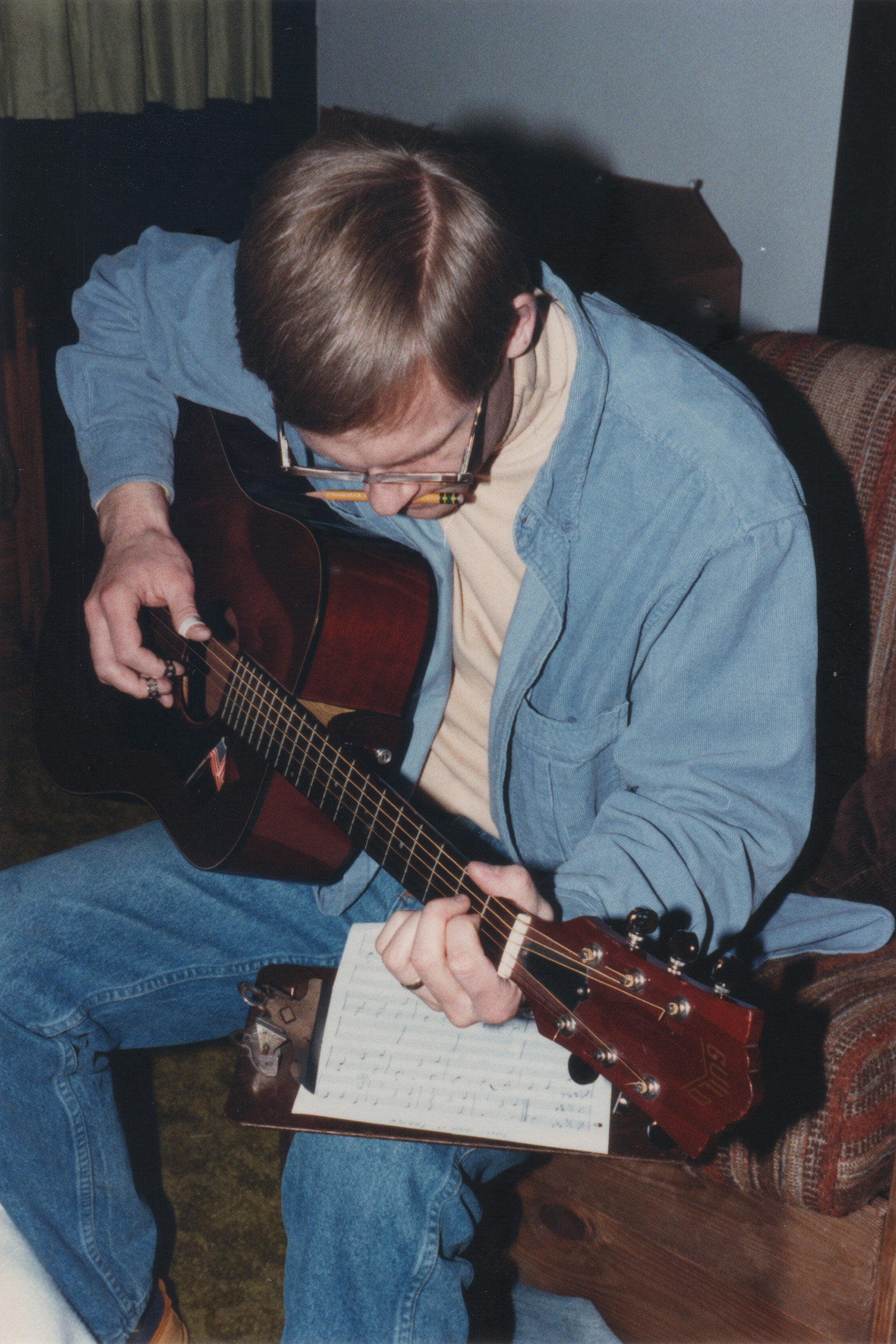
American songwriter Bill Schachter in the late 1980's – photo by Carole Devey Schachter
So Bill, how long have you been writing songs?
I’m trying to think if there was anything that I wrote or wrote down when I was really young... I think I got a guitar when I was in the third grade, and I learned the chords. And I’d had a little bit of sight reading with piano and trumpet which never worked out or lasted [laughs] but I learned enough to read notes. I got some books that had songs like “Sidewalks of New York” and those good old chord progressions with the cycle of fifths or fourths. Oh! I remember I learned – when I was in middle school or high school I learned the chords and words to Roger Miller's “King of the Road” – that song struck me. I liked it. I’ve always liked songs where you didn't have to work at understanding the words. The first album I ever bought was Peter, Paul and Mary – and that was when I was an early teenager, I guess. But what really is... the big... as much as anything, was Kris Kristofferson. It was 1971, my senior year in high school, when I had the motorcycle accident. I was laid up – I was in the hospital for six weeks in traction. Things weren't healing, so they put me in a cast that immobilized my hip and leg and sent me home and it just never did heal right. So, I spent a lot of time laid up with that, and one night I was watching a Tom Smothers show – it was a half hour show, and on comes a little clip of one or two songs of (I think) Linda Ronstadt – and I always liked Linda Ronstadt. I mentioned her in my one song [laughs]. [The show was] at The Bitter End in (I guess) Los Angeles... and then here comes this character, Kris Kristofferson, singing a couple songs, and I just... there was something about his music. It was understandable. It was personal. It was simple yet complete. Y’know? And he had a persona. So, a friend of mine (and coincidentally, the friend of mine that sort of inspired “Hey Buddy Have You Seen The Bus To City Hall Go By”) came over to visit. I told him – I gave him the name “Kris Kristofferson”. I said “go out and buy anything you can find by this guy”. Kristofferson only had two albums out at the time – that's how early it was in his career. That’s when I really took the guitar back up – and I’m imitating the basic picking style of Kristofferson. And because of those couple songs – “The Pilgrim” [and “To Beat The Devil”] – and how his songs were so personal and relatable, I start... I’m thinkin’ back now over my whole writing career... as much as [anything], I wrote as many songs personally, just for a person – for a friend, about that friend.
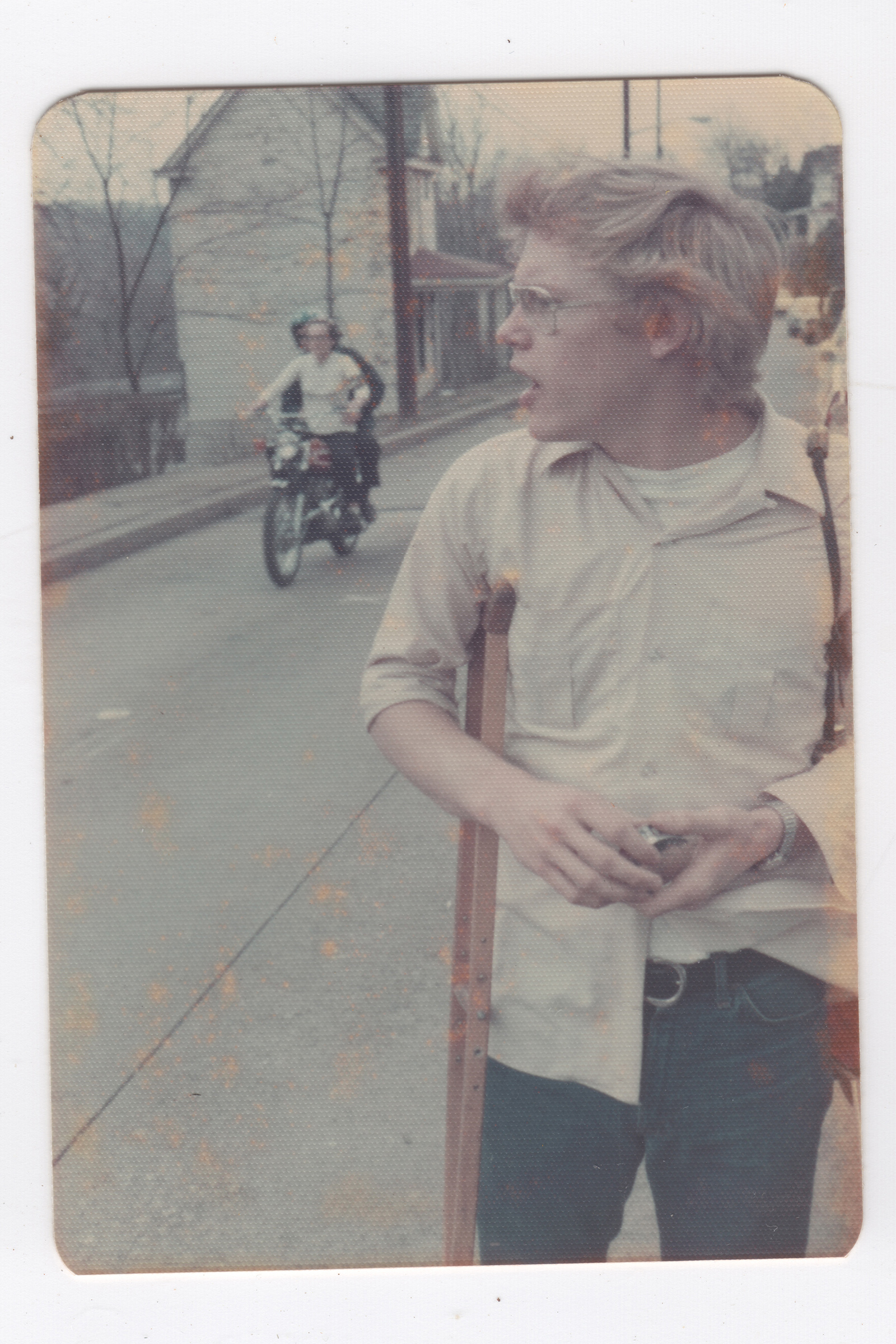
Bicycle Bill on crutches – Pittsburgh, PA – 1971
You mentioned the friend who inspired “Hey Buddy Have You Seen The Bus To City Hall Go By” – I don't know if it's silly to say that it seems so relevant now, because maybe all songs that are talking about politics are like that... But y’know, specifically, there's a lot of lines in it that relate today...
“Hey buddy, have you seen the bus to city hall go by?
I been cheatin’ on my taxes so that I can pay the fare...
...I even took a course in acting so that I might seem sincere”
So, I'm wondering... was there something going on specifically before that, or around then politically? Or was it just in general?
That was the same guy – my friend who went out and bought me the Kristofferson albums – was into local politics. I went to high school with him – I’m still in touch with him. He became elected as a state legislator, and so he was into politics, and I wrote that song for him. Y’know, just to have fun. [Songwriting] always had to be entertaining for myself, in addition to being entertaining for others. And it's funny – I always, I was most comfortable writing for a small group, writing for an individual actually. I mean that’s where “Hey Buddy Have You Seen The Bus To City Hall Go By” – y’know, it was for Rick [Chess]'s enjoyment. And the one thing I wanted to say was that with this album – I look at the collection of songs and I think that, with the exception of “Steel Guitars in Heaven” – none of the recordings... I didn't make any of them thinking “I'll put this on an album” – y’know? They were just fun to do at the time. And I can't imagine... I would’ve approached it differently and it would’ve been probably less fun if I’d have thought “I'm recording this for an album” – I would have wanted perfection. So, it's kind of ironic... and most of the songs on the album have a flaw – an obvious small flaw or two, but that's all part of it as well. Y’know, that's fine. That's what they are – that's what they were.
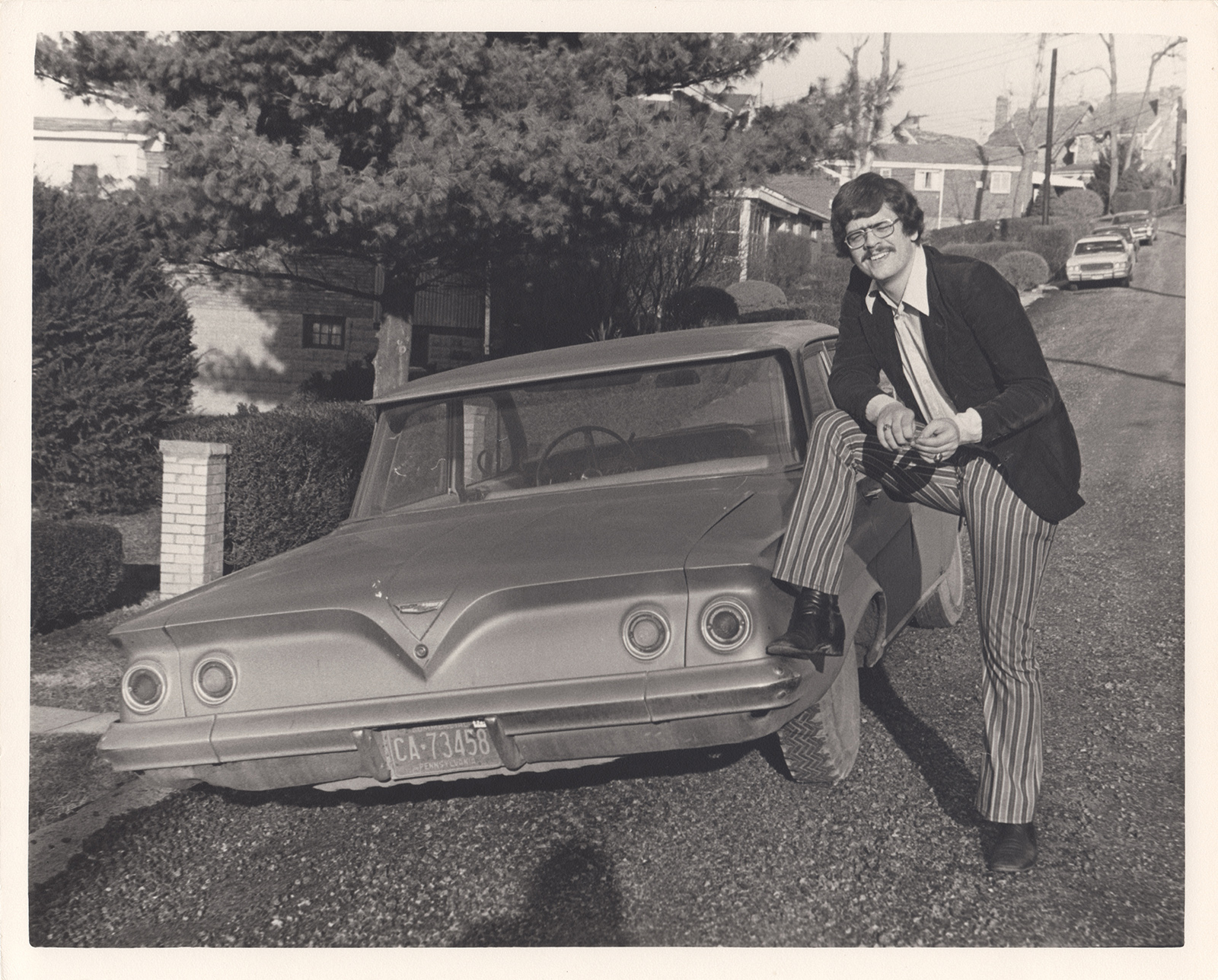
Rick Chess – Pittsburgh, PA – photo by Bill Schachter
So, how about “Don’t Take A Cab”? This one also sounds like it’s based off something true...
Oh, it’s strictly – yeah it was my brother-in-law. We called him “Uncle Kevin” but he was my brother-in-law – he’s an ex brother-in-law now. That's strictly, y’know, a story of what happened. That was an example of something that I wrote for the family. I just wrote it to play for them and entertain them and they loved it. And Kevin loved, y’know, being storied. But yeah, that played out like – exactly as the song says it did.
“And not to shirk, work, and to earn a big tip
The cabbie walked the lady to the door
And when he did Kevin slid in behind the wheel
‘Cause he couldn’t wait no more
And he took that cab...”
This song has you doing your own playful call-and-response vocals. Did you do other recordings like that, where you double yourself?
When I started recording – I ended up getting a little bit of money from the accident – the motorcycle accident. And so, I had enough money – my brother-in-law [Andy Burtner] went out and bought me a reel-to-reel recorder and an amp... and it was pretty quality stuff. And so, I’d always enjoyed recording. So that was back when I was in my late teens and it had this “sound on sound” capability. And I found myself alone quite often with ideas about a second part, y’know, a second musical part or vocal part. So... well, there’s two songs on the album that are that way. One is “Don’t Take a Cab” – that was “me” and “me”, and the the other was “Hey Buddy”. And both of those songs were, well... yeah most all of the songs were one-take songs. I liked recording but I didn't like the tedious part of it, I guess. I didn't want to go back and... if it was darn close, that was close enough for me [laughs]. And sometimes, it wasn’t... it was just for fun and the songs were... if I performed them well enough, it was just because I knew them well enough and I had written them, y’know? It wasn't like I was working that hard at it.

Schematic diagram of Bill's reel-to-reel tape machine – the Sony TC-640
I’m assuming you were the engineer and did all the recordings on the album... or are there any tracks where other people were involved with the process?
I recorded everything with the exception of “Steel Guitars in Heaven” which I recorded in a guy's basement, who was doing it as a business out of his basement. I guess he loved recording – he [Dave Erny] had a big audio board and a two-inch tape machine. And I actually sent that song to some publishers, thinking that this was my attempt at breaking into the music business, y’know? I look back on it now and... I remember calling one of the guys that I'd sent it to – y’know, to follow up and to see what he thought of it, and I remember he had a Nashville accent. He said he was lookin’ for... it’s like “it's fine” but he was looking for a “hit”. He didn't have to say that my song wasn't a hit, but I didn't even understand it at that time. I just thought if I loved my music and I was explaining in the music that I loved my music, that somebody’d see that and tell me to come move to Nashville. That was really the only time [recording something and sending it to publishers]. I recorded two songs when I recorded that – the other one was called “I Love The Part In The Middle” which, that was the title, but the middle part was “I love the part in the middle where they talk just like I'm doin’ here”.
“Yes, I do love Bob Wills’ music
Hark! The Texas Playboys sing
And I hope in heaven’s Austin
They’ll be singin’ for the king”
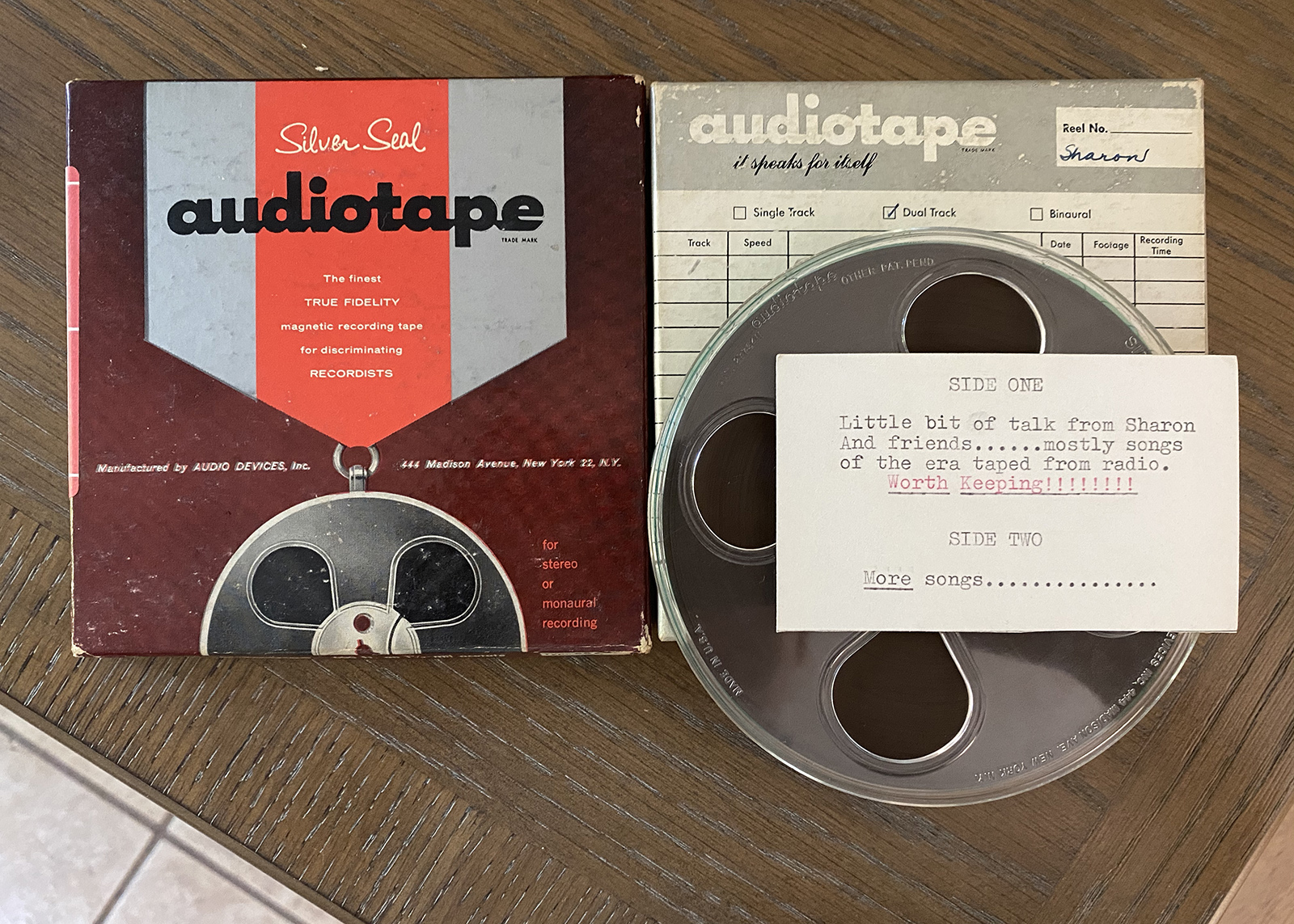
One of the numerous tapes in Bill's collection – sister Sharon's tape
Did you ever have bands backing you when you performed?
No, for the most part I've always been a solo performer. I had a couple of friends – post high school, that I had gone to high school with – that we... would play together for fun. Never played out. But then the one friend, who he now plays the pedal steel guitar and he is a session musician in Ohio – he was good enough, he took lessons... and I never took lessons – [laughs] I never understood them. I thought if I know all the chords and y’know, can play what I want without somebody teaching me – that was fine. But Al [Moss] went the more formal way and he joined the country band playing lead guitar, and that was an opportunity for me to pick up the bass. I bought my first bass guitar and played bass with them – and we played for several years, I guess. Bill Campbell was the leader. It was a four-piece band – Bill playing rhythm and singing, there was drums, and there was Al on the lead, and me on the bass. And we would play bars – ten o'clock till two o'clock. Bringin’ home like fifty bucks a night – which just gave me spending money. I was able to then, pretty much deposit my whole paycheck from work. It was a good deal. That was my only experience with any kind of steady band work.
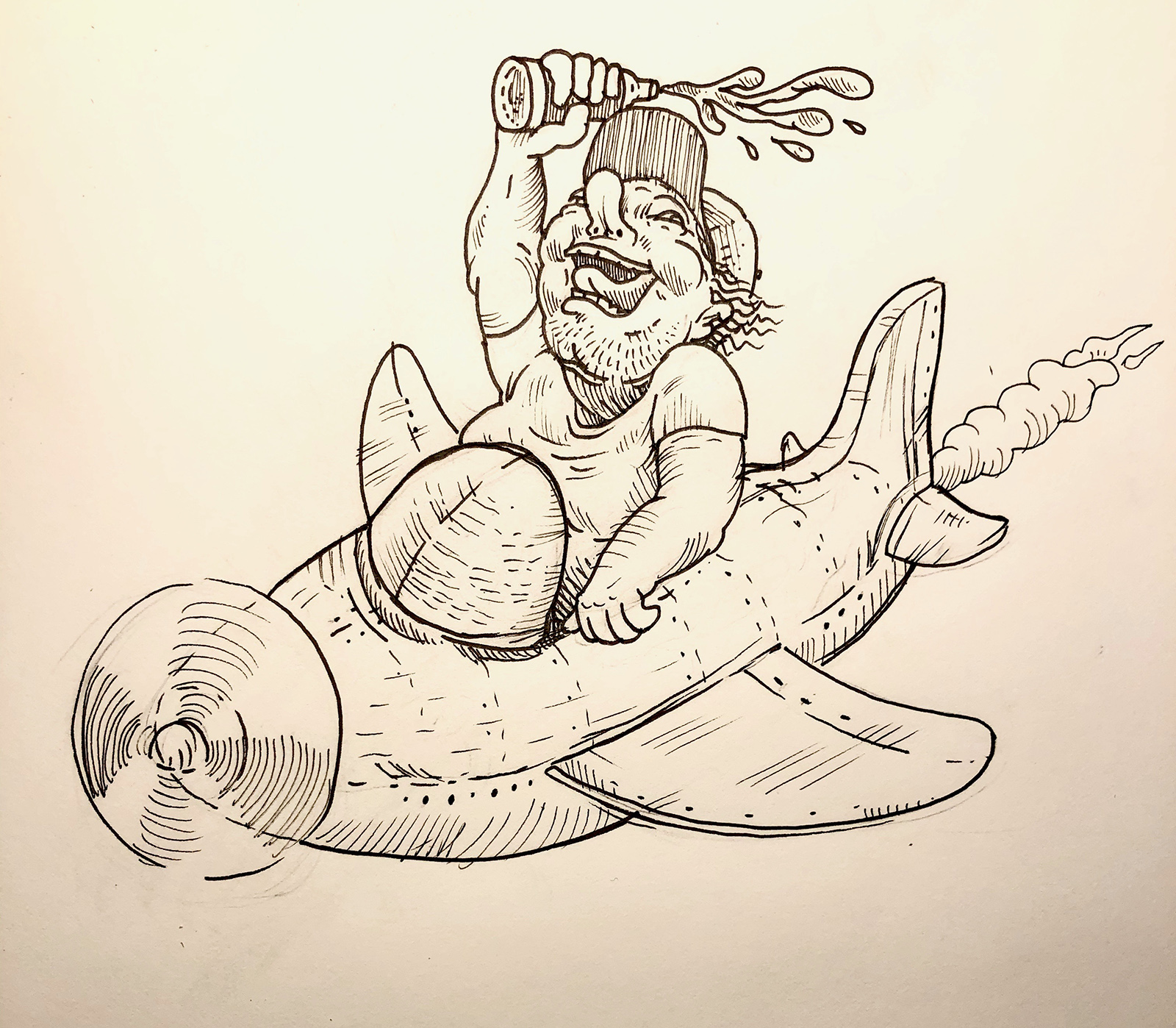
Jimbo – interpreted visually by artist Matt Gilchrest
I wanted to ask about “Jimbo”. I tried really hard to research this song’s story but all I hit was dead ends looking at places called “Brownie’s Bar” or “Dead Man’s Hill”. I tried to cross search things like: “plane lands on top of cars”, “James mechanic”, etc. but I couldn't find anything... So, would you please tell me now – is this song based in any reality or is it just a tale?
It's just a tale. It wrote itself over a period of many years. When I first started writing it, it didn't have any kind of a “be careful how much you drink” message. It was just about Jimbo and y’know, it was a story about this character at the bar who drank and wanted to fix the airplane but didn't pay attention... y’know, he's kind of a – when I picture Jimbo I see, uh, like a Walt Disney character – sitting in a plane that doesn't have a cockpit. Jimbo’s a little overweight and uh, he's like Fred Flintstone, maybe. And the song just finished itself over a period of many years. It just sat around and I’d... I don't know where it started actually. Brownie’s Bar – Brownie’s was the name of a bar where a friend of mine [Buzza] bartended. I don't know if I was ever there... I have an idea it was a small bar. I think it was the Pittsburgh area – I haven’t talked to Bruce [Buzza] for a while. Time flies... I may have recorded that version of it 15 or 20 [laughs] years ago. I recorded it when I was living in this house, which would have made it sometime after the turn of the century. So, let's call it 2000 and... 5.
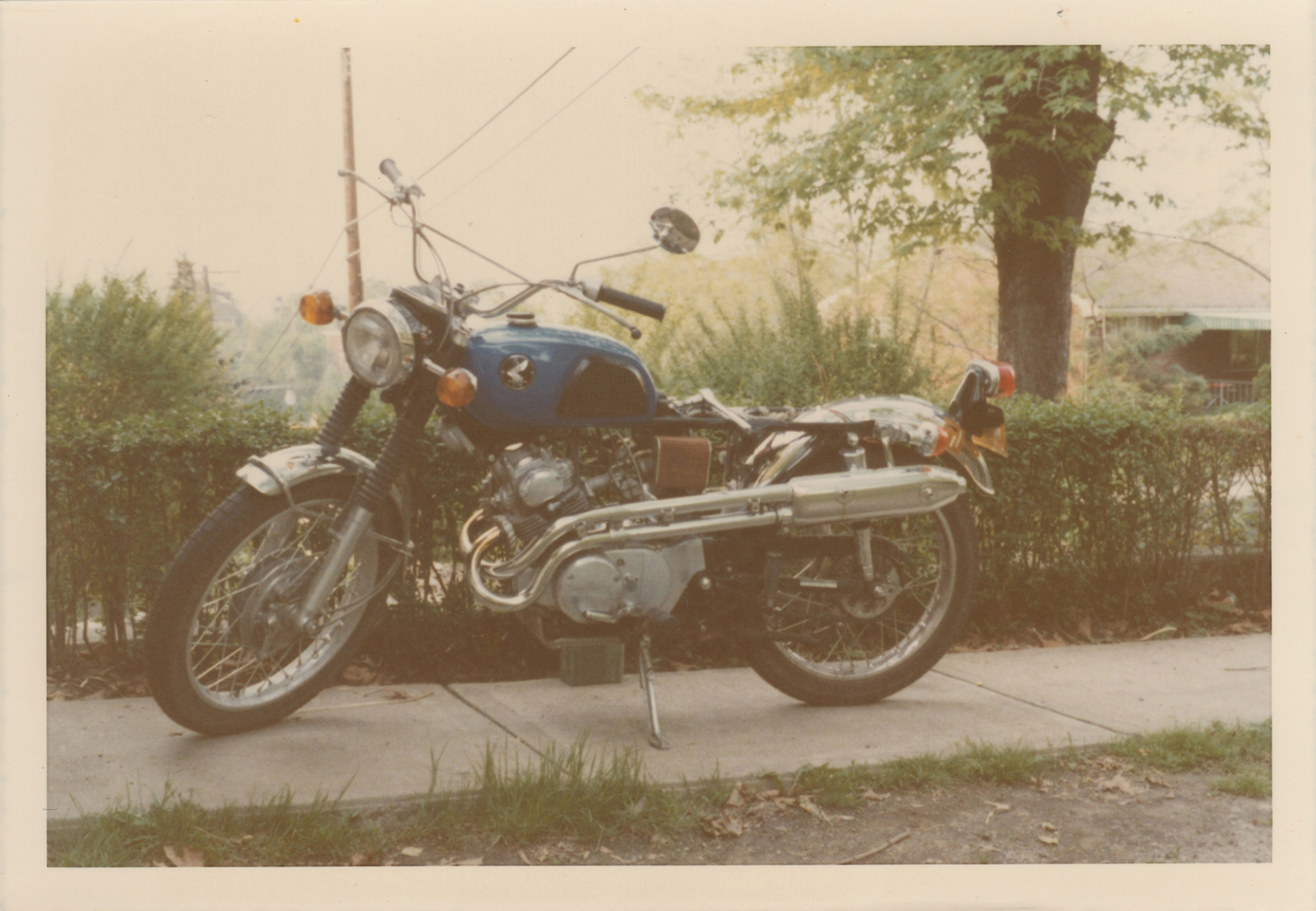
Bill's first bike – purchased in the late 1960's
In your recording of “On The Sunny Side Of The Street” you call yourself “Bare Finger Bill” but I was told that your nickname was “Bicycle Bill”. So, how many nicknames does Bill have?
Well, funny you should ask... Brian had us decorating the shipping boxes for the album. And yesterday, my choice of decoration was to just use the A–Z letters and put all my nicknames on there. “Bicycle Bill” was the first one... well, my father always called me “Sam”. I'm William George Jr. but he called me Sam. And when I was a teenager, I worked at a store that sold jewelry and furniture. I was more the furniture and appliances – I was a stock boy. And one of the salesmen – a short Jewish guy named Bruce Morris – he was fun, and he decided... I rode my motorcycle to work, and he decided I should be called “Bicycle Bill”. I'd walk into the room and he’d go “Where's Bicycle Bill?” [laughs]. And I liked it, so I took that name home with me, y’know, and shared it with my friends. So, yeah, a lot of my friends just started calling me “Bicycle Bill” or “Bike”. And then especially – I worked at a summer camp [Falcon Camp] where I made a lot of friends that remain friends, and that's where “Bike” really took off. I liked that idea – that was the main one, I guess. But then I started playing with the idea – I like it... so whenever I had an opportunity, I’d call myself “Dollar Bill”... and then with my church songs, which are sort of in a different category – “Bible Bill.”
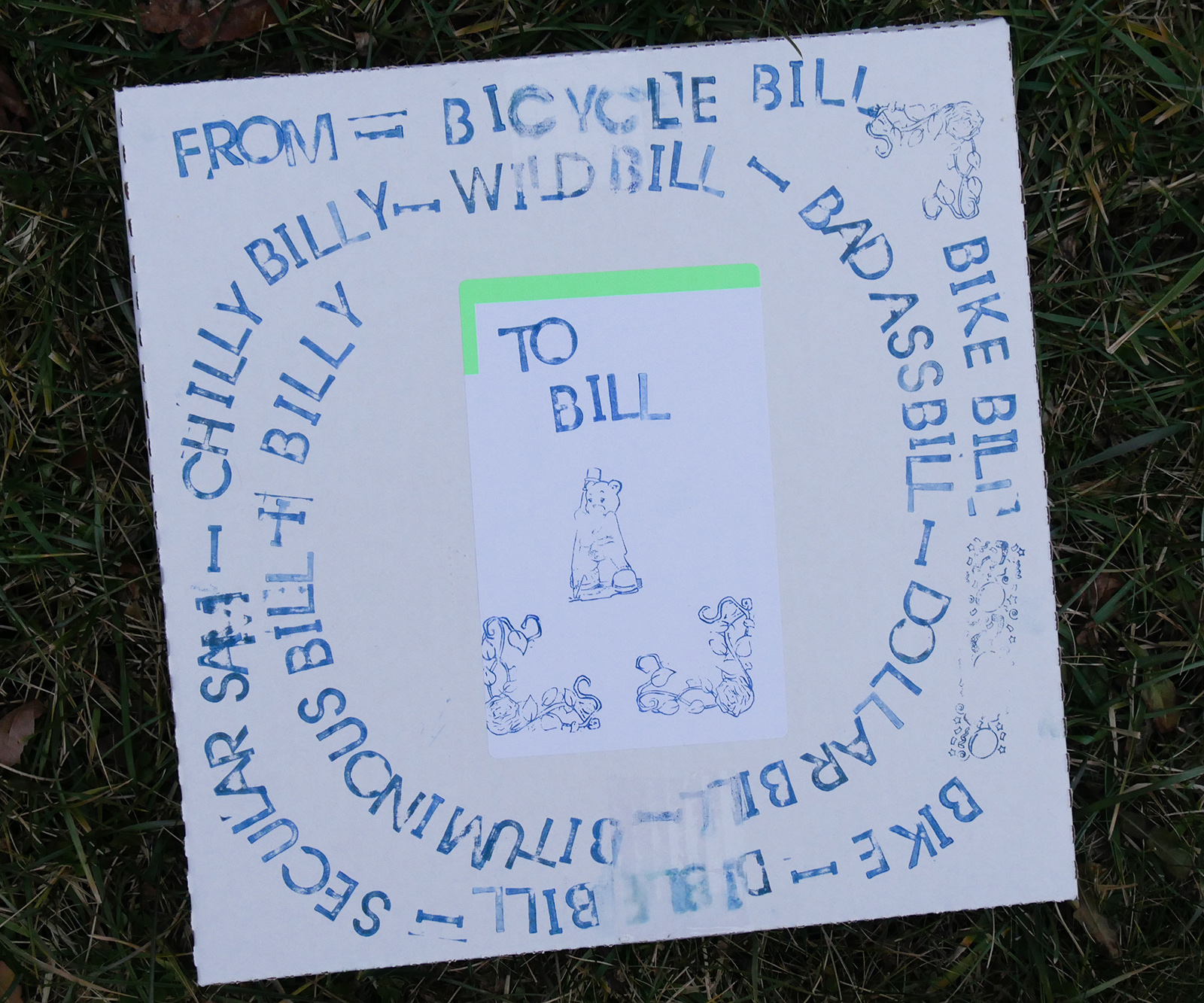
Bill's contribution to The Ultimate Stamp-Off Competition™ (decorating the shipping boxes for Bill's album). Note: He ran out of space for "Brother Bill".
You have church songs? Such as?
I wrote a song called “Jesus Had A Hard Time Too” which, I mean... oh! The title of that – I heard the guy that ran the summer camp [Jack Hardman], after having an argument, or y’know – a discussion with his wife, he came out the door of the office saying “well, Jesus had a hard time too” and I just thought... and that stuck with me. I thought – ”that's a good line”. So, let's see... the first verse of that song that I wrote was “If you've ever had a real bad day, I have got a song for you. If nothin’ seems to go your way, I have got a song for you. If trouble, pain, fear and woe, follow you where e’re you go. It might ease your weary mind to know that Jesus had a hard time too” – and there’s four or five verses to it. And I sang that song in the church – the presbyterian church where I attended and people loved it, and that’s how [as “Bible Bill”] I was remembered by a number of people.
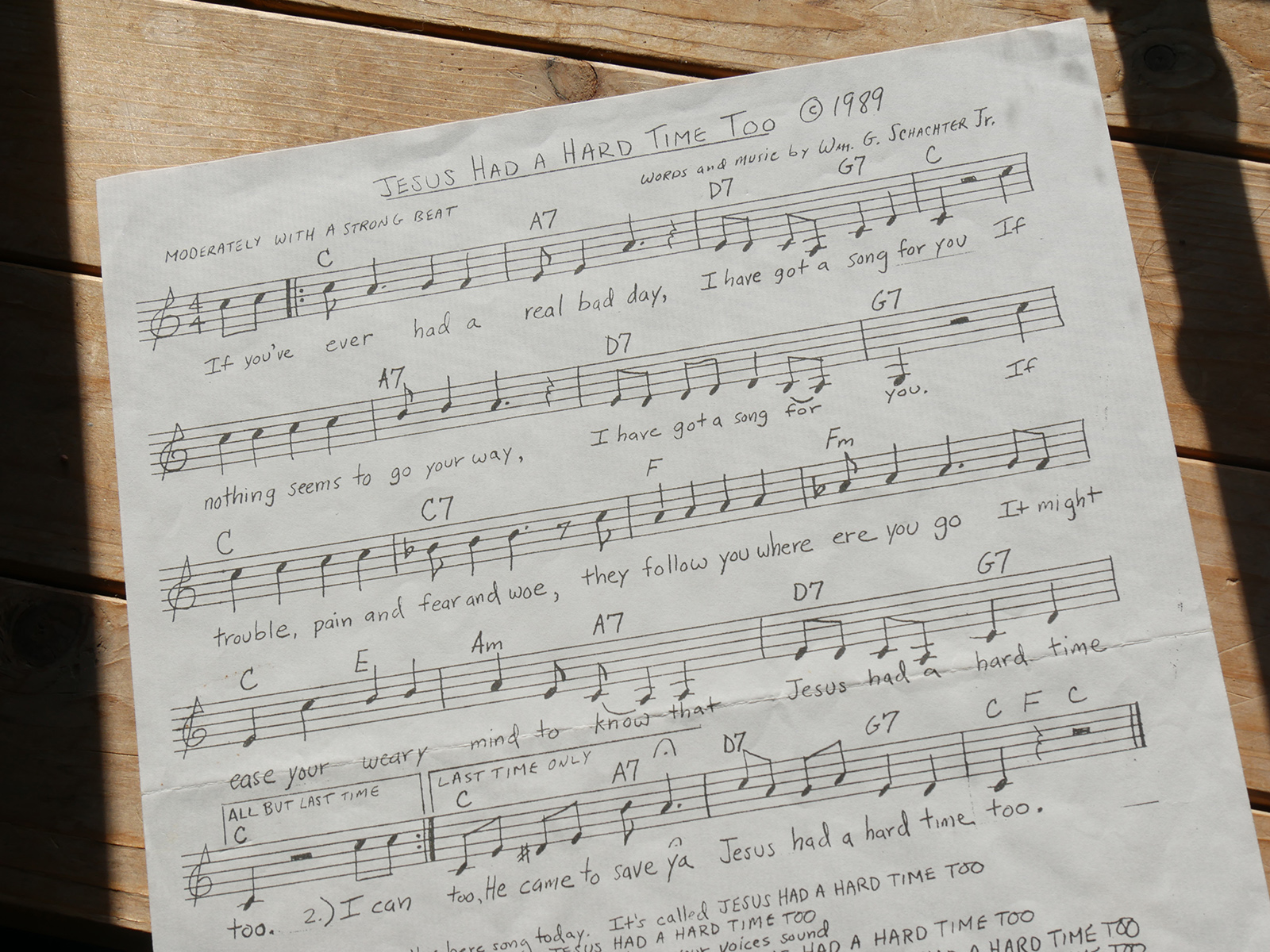
Handwritten sheet music & lyrics to Bible Bill's original tune "Jesus Had A Hard Time Too"
“Lookin’ For Paradise” – I’d say that’s the song I’ve listened to the most. That’s the song that I was like – “I gotta learn how to play this on guitar immediately, I wanna be able to sing this song”. It’s a great tune. It’s such a great song and it means a lot to me to listen to it, and thinking of my own relationships and things like that. So, what do you think? Still lookin’ or... not find it? Or how does that work?
[Laughs] Oh, I don't know, I think that song just almost wrote itself. Like you hear John Prine say if he didn't write it, somebody else would have, y’know, it was floatin’ around... The two verses in that song are about two specific real things – real instances. And the chorus “lookin’ for paradise” – I don't know... it was just there. It came to me. I've never had any luck saying “okay, I'm gonna sit down and write”, y’know? So, I could’ve never been a Tin Pan Alley writer or, y’know – Rodgers and Hammerstein.
“I’d like to quit lookin’ for paradise
Or find it, one of the two
But I can’t, and I won’t, and I can’t understand
How the best is the best you can do”
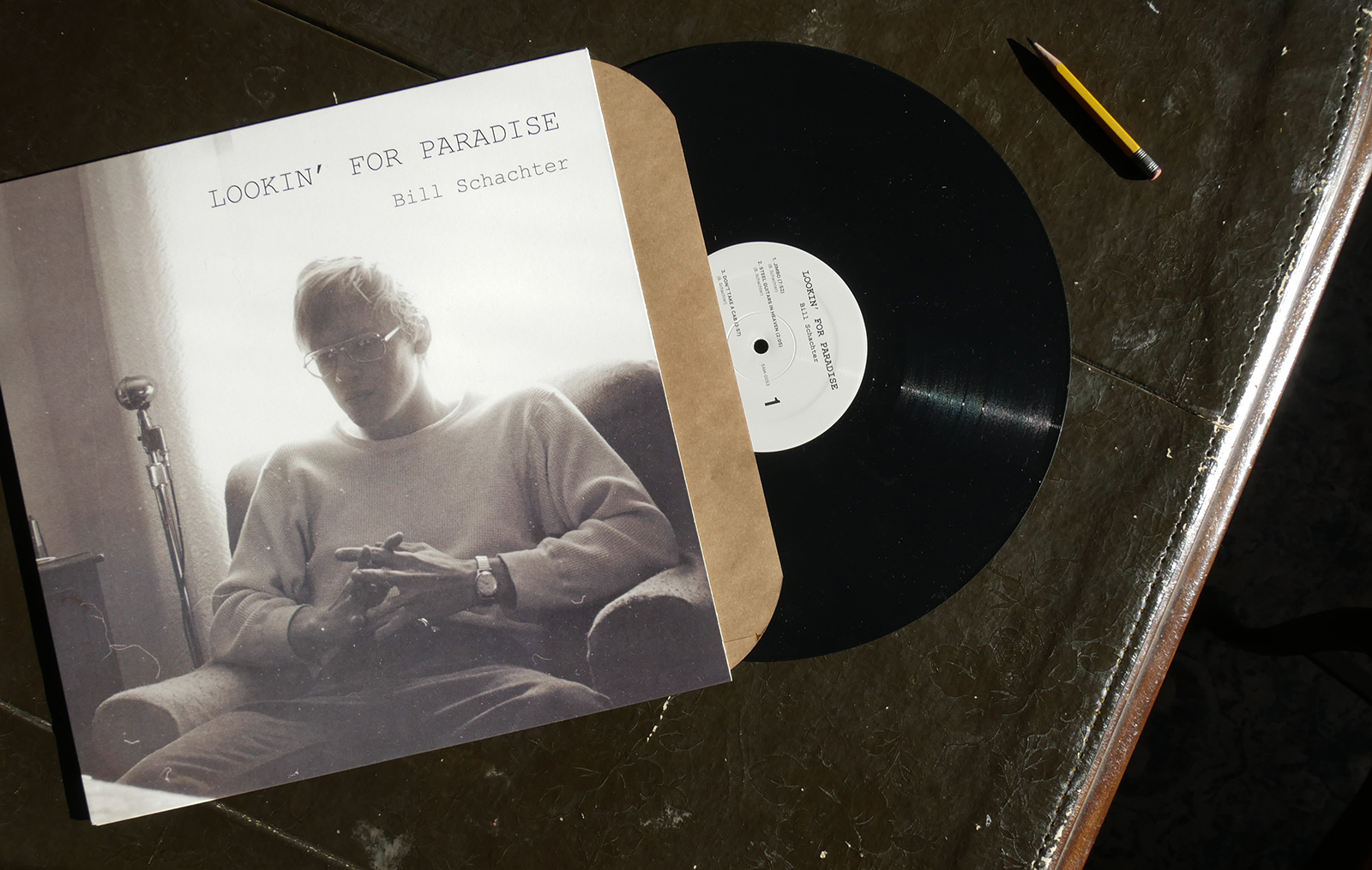
Lookin' For Paradise – 12-inch 33⅓ RPM vinyl record – released December 31st, 2020
It’s surprising at the end of the album, at the end of the track “Lookin’ For Paradise” to hear an applause and realize it’s from a live show. Where was this recorded? Was this at, like, a local bar?
Yeah – the folk club. That recording was actually made [by Bill Hall] and then became part of a compilation of the best of the open mic at our local folk club [Godfrey Daniels]. And so, the audience was there... but it wasn't an actual open mic – it was more a formal “come down and record your song for the CD” – and so there were several other people at all times there, and they were the audience and they applauded, so that's why it was so quiet during the song, because we were recording. It took me years [going to the open mic there] but it was great – at the point where I would go down and I would know most of the people, or I would know half of the people, and I finally fell into a comfort level that was just great.
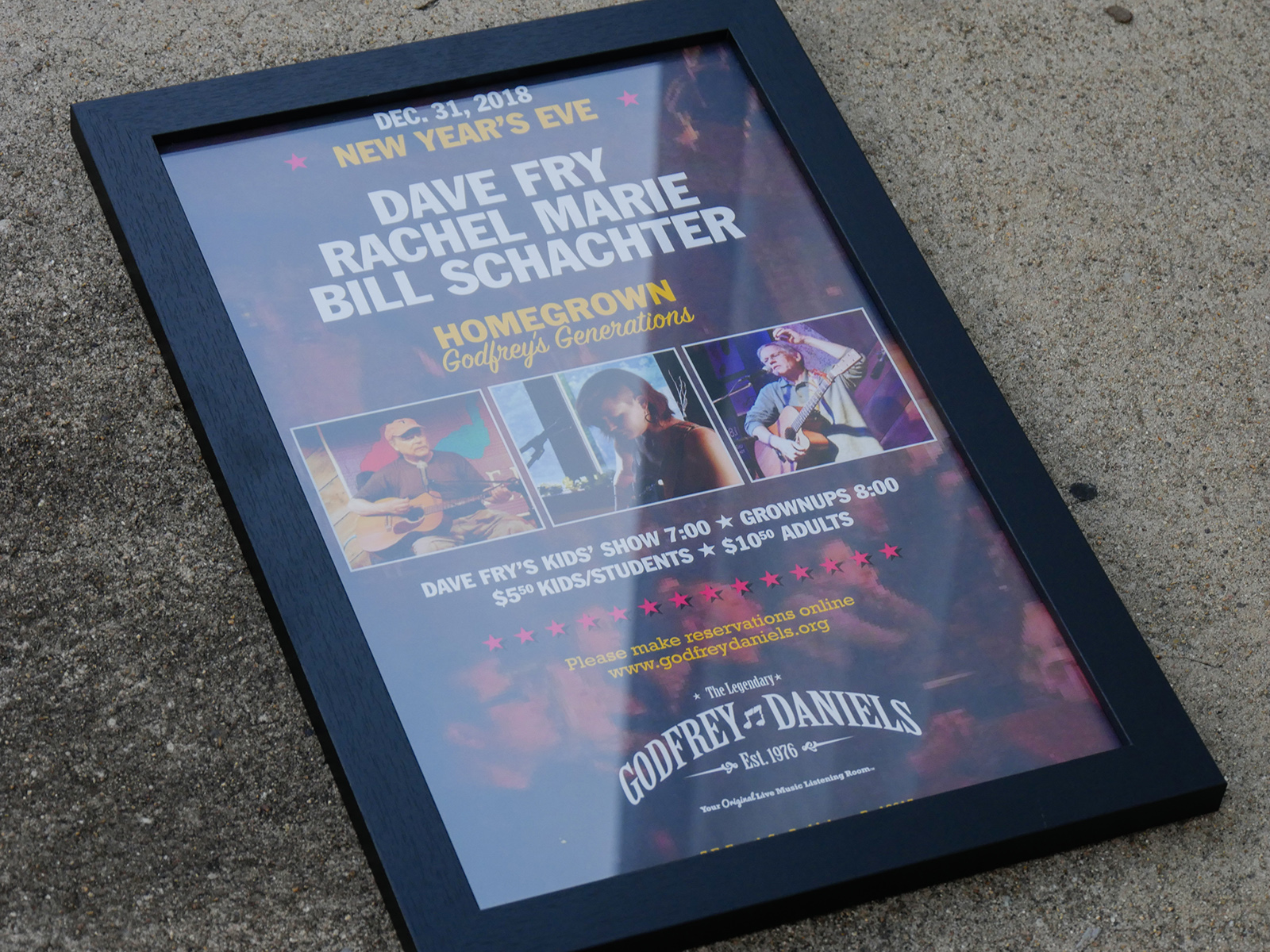
Poster of Godfrey Daniels New Year's Eve 2018 with Dave Fry, Rachel Marie (Schachter) and Bill Schachter
Did you ever spend any chunks of time making visual art or something that's beyond writing?
Well, I enjoyed cartooning... and it's kinda like with my writing – I was imitating Kristofferson. When I was in my late teens, I discovered Zap Comix – which were authored by Robert Crumb. If you don’t know his stuff, it’s worth looking at, I think. That grabbed me, y’know, and I wanted to... the same way with music I think – the feeling that I got from music, that I took away – I wanted to share. I wanted to make more and share that and have other people feel the same way I felt when I heard music, y’know? If possible... and it was the same way with the cartooning. Well, when I was in the hospital, I got pen and ink and wrote a couple complete, like – comic books, y’know? One was called The Fracture of Fate which is a story several pages long in cartoon form, and so that was something else I played with. Oh! And that would make... especially when I was recuperating from the accident and had time on my hands – I would make these detailed Christmas cards for family, mostly family and friends. But I mean, I came across one several months ago, and I couldn’t believe the detail – the picture of Santa. And again, it was in the – sort of like my interpretation of the Robert Crumb style.
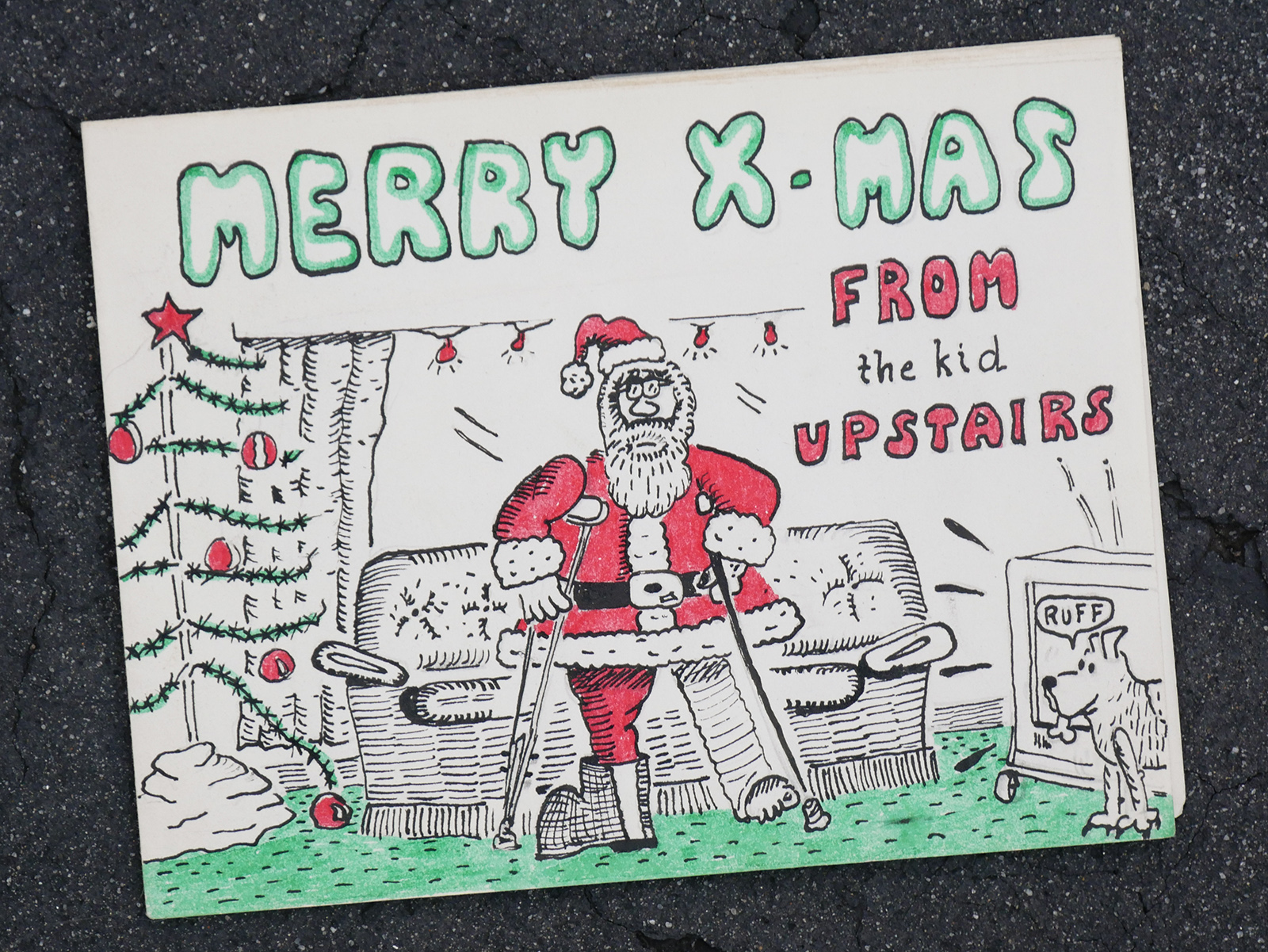
Handmade Christmas card for the family – from "the kid upstairs" AKA Bicycle Bill
Mostly there had to be – there was some humor in everything I wrote. I think there’s – to some degree, there’s humor in everything I think and say, y’know – for the most part, even if it’s serious. I've written some poetry over the years, again, just like the songs, only when it came to me easily. I’ve written letters. I’ve saved carbon copies of letters I wrote. I said to Brian, sometime in the last few weeks or months, maybe as much as anything – I consider myself a writer. Never professionally, y’know, but I always wanted to entertain with letters that I wrote. My sisters [Laurel and Sharon] are five years older and six years older than me [respectively], and I would write letters to my sister [Sharon] and her husband when they were down in Cherry Point, North Carolina in the military. And I know they loved them, and I worked at them, but it wasn't difficult. I enjoyed writing comedy – real comedy from real life, y’know? And just putting it in a comical perspective. Which is what, I think you have to do. That's what, y’know – “the best is the best you can do” and y’know, and life isn't perfect. You gotta laugh at it.
After the phone call, Bill messaged me about The Smothers Brothers being a big influence on him – and then, with a big smile on his face, proceeded to watch video clips of them on the television with his wife of 33 years, Carole, sitting by the fireplace.
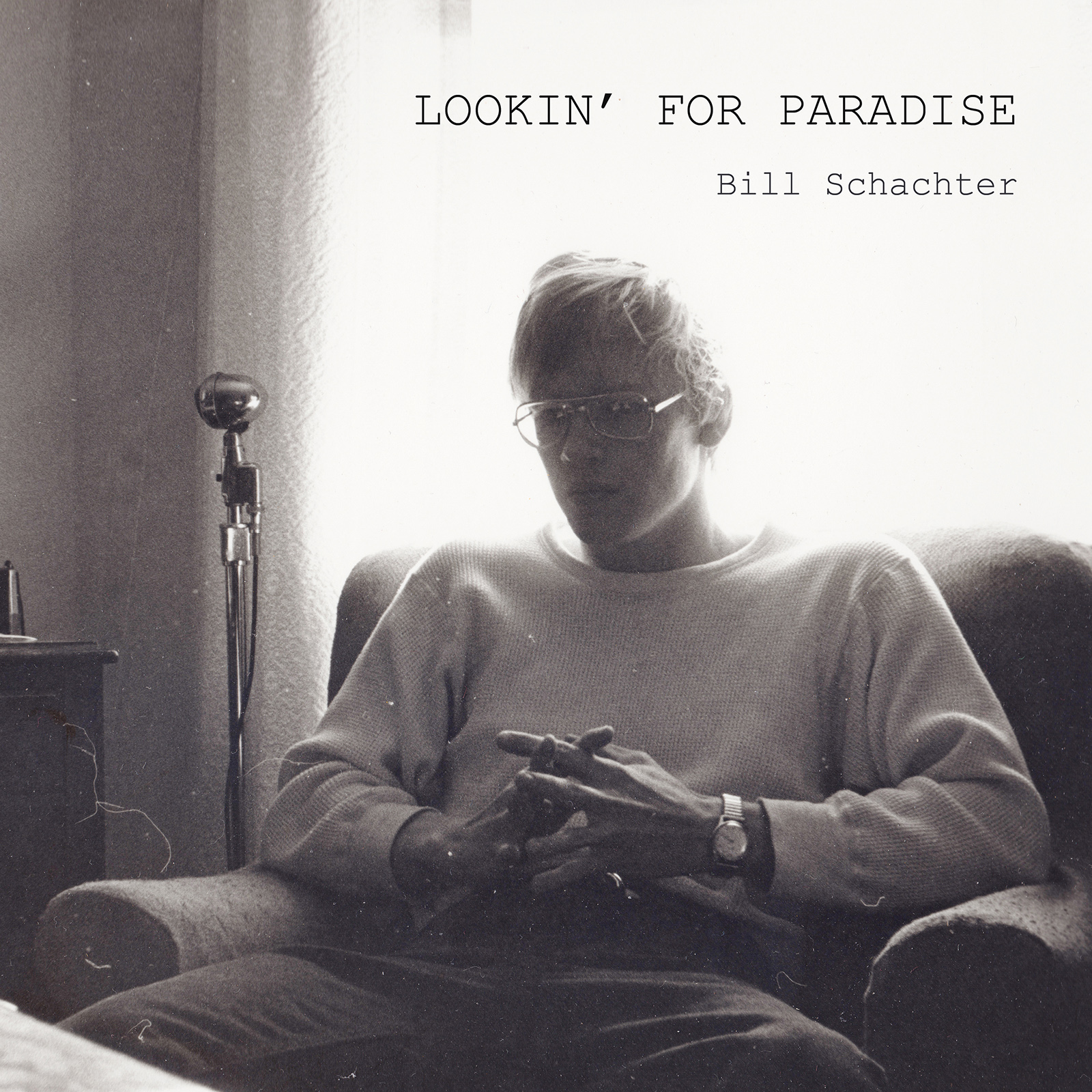
Bill Schachter
Lookin' For Paradise
Vinyl Records & Digital Downloads: Click Here
Listen on: Bandcamp, Spotify, Apple Music
Follow on: Instagram, Facebook, YouTube
See the other site: BicycleBill.net